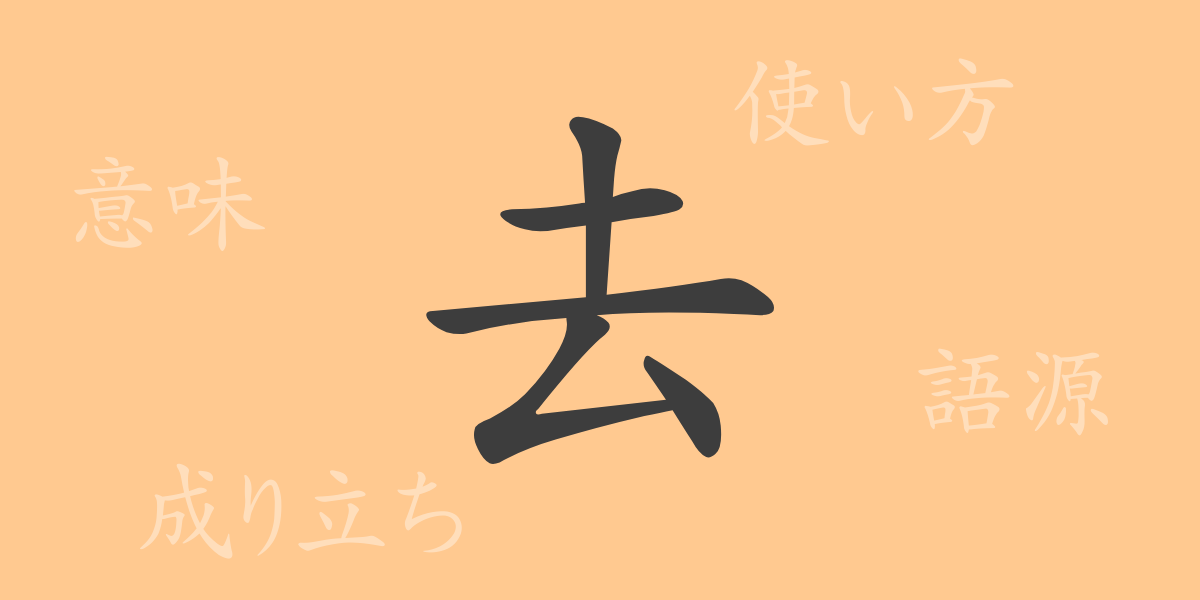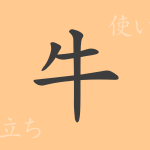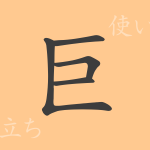The meaning and history behind a single kanji character can provide deep insights into the culture and language of a country. The common kanji “去(きょ, kyo)” is frequently used in daily life, yet opportunities to delve deeply into its origins and various usages are surprisingly rare. This article explores the full scope of “去(きょ, kyo),” from its etymology to idioms and proverbs, uncovering its complete story.
Origin of 去(きょ, kyo)
The kanji “去(きょ, kyo)” was created in ancient China to represent the action of “leaving” or “departing.” It evolved from a pictograph and ultimately settled into its current form, which depicts a foot stepping away from “土(つち, tsuchi)” (ground) with “卩(せつ, setsu),” symbolizing a bent shape. This shape visually represents the concept of something moving away.
Meaning and Usage of 去(きょ, kyo)
The kanji “去(きょ, kyo)” means “to leave,” “to go away,” or “to pass.” It is often used to describe the action of moving away from a place or time, both in concrete and abstract contexts. It is also used to refer to past events, as seen in words like “去年(きょねん, kyonen)” (last year) and phrases such as “去ることながら(さることながら, saru koto nagara),” meaning “that aside” or “be that as it may.”
Readings, Stroke Count, and Radical of 去(きょ, kyo)
The kanji “去(きょ, kyo)” has rich readings and meanings, despite its simple shape.
- Readings: The on-yomi (Chinese reading) is “キョ(きょ, kyo)” and “コ(こ, ko),” and the kun-yomi (Japanese reading) is “さ.る(さる, saru),” “い.なす(いなす, inasu),” “い.ぬ(いぬ, inu),” and “お.う(おう, ou).”
- Stroke count: The kanji consists of 5 strokes in total.
- Radical: The radical is “土(つち, tsuchi),” meaning “earth” or “ground.”
Idioms, Proverbs, and Expressions Using 去(きょ, kyo)
Numerous idioms, proverbs, and expressions feature the kanji “去(きょ, kyo).” Here are a few examples:
- 去就(きょしゅう, kyoshū): Deciding whether to leave or stay; making a crucial decision about one’s course of action.
- 去来(きょらい, kyōrai): Coming and going; can also refer to the movement or change of thoughts and feelings.
- 去勢(きょせい, kyosei): Castration in animals; metaphorically, it can mean depriving someone of power or will.
- 去年(きょねん, kyonen): Last year; refers to the previous year.
- 去ることながら(さることながら, saru koto nagara): That aside; used to shift the topic of conversation.
Summary of 去(きょ, kyo)
The kanji “去(きょ, kyo)” carries a wide range of meanings and usages, despite its simple appearance. From everyday conversation to literary expressions, and even idioms and proverbs, it plays a vital role in the Japanese language. Understanding “去(きょ, kyo)” is a gateway to appreciating the depth of the language and recognizing the rich expressive power it holds. By exploring this character, we can gain a greater appreciation for the richness of Japanese language and culture.

























